- Home
- Martin Cruz Smith
Rose Page 6
Rose Read online
Page 6
Smallbone listened unprovoked, a pat of butter that wouldn’t melt in a furnace. She turned her attention back to Blair. “Could you see me in a factory? Flouncing around in a skirt, seeing to a bobbin here and a spool there? Going pale and deaf and tied to a machine? Not me. And not you, because you never see any photographers in a factory. People only want to buy pictures of women at a mine.”
A voice behind them said, “He’s no photographer.”
Blair looked up at a young miner wearing a jacket with a velvet collar and a silk scarf with brown spots. He recognized Bill Jaxon from the picture of the rugby team.
Jaxon said, “Last night he visited Rose.”
The rest of the pub was silent, a tableau. It struck Blair that Jaxon’s entrance was expected. Relished. Even the Young Prince’s glass eyes seemed to show a fresh gleam.
Jaxon said mildly, “You didn’t knock, did you? She said she was lucky to be dressed.”
“I apologized.”
Flo said, “Bill, he’s drunk. Besides, he’s got no clogs. He’d be no sport at all.”
Jaxon said, “Hush up, Flo.”
What clogs had to do with sport, Blair didn’t know.
Jaxon delivered his attention back to Blair. “You’re from the Bishop, Rose says.”
“From Reverend Maypole’s family, I heard,” Smallbone said.
“Both.”
“A distant relation?” Jaxon asked.
“Very distant.” When Blair twisted in his chair to look up at Jaxon he had a sensation of envelopment, like a mouse in a large hand. It wasn’t comfortable. Bill Jaxon had fair features and straight dark hair, exceedingly combed, a pearly scarf tucked under a plowshare of a jaw, the sort that could make an actor’s career. Blair said, “I was asking Rose about Reverend Maypole. Weren’t you on the same rugby team?”
“We were.”
“Maybe you can help.”
At a signal Blair hadn’t caught, Smallbone jumped from the chair and Jaxon sat. The man was the center of attention, a sun in the benighted universe of this pub, Blair thought. He remembered how in the photograph Maypole had been looking at Jaxon instead of at the camera. Jaxon’s eyes said he took questions as seriously as charades.
“Ask away.”
“Did you see Reverend Maypole that last day?”
“No.”
“Do you have any idea what happened to him?”
“No.”
“Did he seem unhappy?”
“No.”
That seemed to cover it, Blair thought. For form’s sake, he added, “What did you talk about with John Maypole?”
“Sports.”
“Did you ever talk about religious matters?”
“The Reverend said Jesus would have been a champion rugby player.”
“Really?” This was a revelation, a contribution of muscular theology: Christ in a scrum, breaking tackles, dashing upfield between centurions.
“The Reverend said Jesus was a workingman. He was a carpenter and fit, so who can say he wasn’t a great athlete as well? John said that Christian competition was a joy to God. He said he’d rather be on the field with our team than in church with all the dons at Oxford.”
“Makes sense to me.”
“All the disciples, the Reverend said, were workingmen, fishermen and the like. John said that impure thoughts undermined the athlete as much as any archbishop, and that it was the special duty of the strong to be patient with the weak.”
“I’m glad to hear that.” Blair didn’t feel at his own physical peak. “Exactly what positions did the disciples play?”
“What do you mean?”
“What positions on the team? Peter and Paul? Wingmen, you think? And John the Baptist? Lots of brawn, I would guess. Right wing?”
The pub became quiet. Jaxon liked sending up a visitor; he didn’t like being sent up himself.
“You shouldn’t make fun.”
“No, you’re right.” Blair caught a glow in Jaxon’s eyes. It was a bit like stirring coals. “So my lost cousin John was a theologian and a saint?”
“That’s one way of putting it.”
“Two ways, actually.” Blair decided to get out while he could navigate. He picked up his knapsack. “You’ve been so helpful I can’t say.”
“Are you going back to America now?” Flo asked.
“Maybe. Leaving Wigan, at any rate.”
“Too quiet?” Jaxon asked.
“I hope so.”
Blair wove to the door. Outside, an early twilight was turning to the dark of a cave. The street was a tunnel of gas lamps and beerhouse doors. Too late he remembered the fear expressed by his driver the night before. The man had plainly exaggerated, but there wasn’t a cab in sight.
Mill girls in wool shawls and cotton dresses and carrying food cans rushed by, and the sound of their clogs was deafening. He felt the gin circulating sluggishly in his brain. When he had walked a couple of blocks, however, he realized what Bill Jaxon had said—or not said. When Blair had asked if he had seen Maypole that last day, Jaxon’s answer shouldn’t have been “No”; it should have been “What day was that?”
Though it was a small point and Blair knew he should hurry to meet Leveret, he turned around and made his way back to The Young Prince. When he arrived, he wondered whether he had walked into the wrong pub because the room that had been full was empty. From his pedestal The Young Prince presided stiffly over abandoned chairs, fireplace and counter.
Blair knew that no crowd had passed him. Through the rear door of the pub he heard shouts. He opened it and edged carefully past a hole used as a pissoir to a junction of back alleys. Here, where there were no gas lamps, there was light from lanterns held on poles and clamor from at least two hundred people, including patrons and employees of The Young Prince, other miners, women in skirts, pit girls in pants, families with babes, all of them festive as if at a fair.
It was a scene from Bosch’s Garden of Earthly Delights. Or an ancient Olympic contest, Blair thought. Or a nightmare. He stayed in the dark unseen, though he could see Bill Jaxon standing naked in the middle of the crowd. He had a miner’s overly defined body, the pinched waist and stark muscles that were the result of hard labor in extreme heat. His skin, pale as polished marble, contrasted with his dark hair, which now looked ruffled and wild. A second man had also stripped. He was shorter, older, with a barrel chest and bowlegs. His head was shaved and his shoulders bore a backlit nimbus of curls. Behind him waved a green satin banner embroidered with an Irish harp.
Jaxon bent and laced on his clogs tight. Lancashire work clogs were leather uppers on ash soles, irons shaped like horseshoes on the soles for wear. Jaxon’s were tipped with brass studs. He draped his scarf lightly around his neck and paraded like a thoroughbred in a paddock.
Jaxon’s opponent advanced with the intent rolling gait of a bulldog. His shins were crosshatched with scars. His clogs were tipped with brass, too.
It wasn’t human, Blair thought. More like cockfighting between rooster men wearing razors. In California they would have boxed with bare knuckles, which was effete by comparison. The mining-camp behavior was familiar: backbreaking work relieved by blood sport. The wagering was also familiar; now Smallbone’s money pouch made sense.
The bartender from The Young Prince said, “The rules are no high kicking, punching or biting. No wrestling to the ground. When a man goes down or breaks off or calls ‘Quit,’ the match is over.”
The other man was Irish. He told Jaxon, “You’ll look grand with a tin dick.”
“Fuck the rules,” Jaxon told the bartender. The smile released on his face was reckless, nearly gleeful.
The two opponents stepped back for a moment. A brass-tipped clog made a massive club, especially when swung with the full force of a miner’s leg, and particularly against unprotected flesh. A miner could batter down a wooden door with his clogs.
In the lull Blair took in the feverish brightness of the bartenders’ aprons, the whiteness of the two
men in the swaying lights of the lanterns. It was a saturnalia, he thought, nothing English about it. It was clear from their faces that Jaxon was the favorite of Flo and the other pit girls and the object now of their anxiety.
The two men placed their hands on each other’s shoulders and touched their foreheads together. Even while the bartender tied them loosely together at the neck with Jaxon’s scarf they started pushing and angling for position. At close quarters a shorter, more experienced man had the advantage. The Irishman’s threat was a veteran’s trick, Blair thought. Let Jaxon try to protect his manhood and he’d be fighting on one leg. More likely he would go down with a shattered leg than a ruptured testicle.
The bartender held another scarf high. Waiting for it to drop, the two fighters leaned forward, heads touching. Flo and her friends put their hands together in prayer.
The bartender snapped the scarf down.
Ballet, Blair thought, as danced in Wigan. The first kicks were so swift that he couldn’t follow them. Both men were bleeding from the knees down. With each hit a violent red blush spread on their skin. The Irishman tried to cave in Bill Jaxon’s knee from the side. As Jaxon slipped the Irishman slashed his clog up, slicing Jaxon from knee to groin.
Jaxon leaned away and hammered his forehead down on the other man, whose shaved head split like a porcelain bowl of blood. Jaxon sidestepped a blind, retaliatory butt and swung his own leg from the outside, scooping the smaller man into the air. The scarf shot up into the air. As the Irishman hit the ground Jaxon swung his foot with his full weight. Clog and ribs met with a crack. A moan rose from the men below the banner of the harp.
The Irishman rolled and coughed black phlegm onto the dirt. As he hopped to his feet he struck back, stripping skin from Jaxon’s flank. Jaxon’s next blow caught the Irishman in the stomach and lifted him into the air again. The Irishman bounced from the ground to his knees and swayed. A bright effusion of blood flowed from his mouth. In that moment the fight was already over, except that it wasn’t.
Jaxon announced, “The man who bothered Rose, he’s put me in a mood,” and his kick swung forward like the blur of a wing.
The Cannel Room was the strangest formal dining room Blair had ever seen.
Bishop Hannay sat at the head of the table. Around it were his sister-in-law, Lady Rowland; Reverend Chubb; a union man named Fellowes; Lady Rowland’s daughter, Lydia; Earnshaw, the member of Parliament from the train; Leveret; Blair; and at the foot of the table an empty chair.
The Cannel Room’s ceiling, walls and wainscoting were paneled in polished black stone. Table and Queen Anne chairs were hand-turned work of the same material. Chandelier and candelabras seemed carved of ebony. Yet the walls showed no marble veins. The weight of the chairs was wrong. The temperature was wrong; marble always felt cooler than the air around it, but when Blair laid his hand on the table it was almost warm. Properly so, since cannel was jet, a form of clean, exceedingly fine coal. He had seen sculptures in black cannel. The Cannel Room was the only room made entirely of coal, and it was famous. Its effect was heightened by contrasts: the luminous shimmer of silver and crystal on the black table, the deep purple of Lady Rowland’s gown, the camellia-white of Miss Rowland’s dress.
The men—except for Blair, of course—were all dressed for dinner in black, Hannay and Chubb in cassocks. The butler was assisted by four footmen in black satin livery. The floor was carpeted in black felt to silence the sound of their feet. The effect was as if they were dining in an elegant hall far below the surface of the earth. Blair ran his hand over the table and looked at his palm. Clean: not a speck of carbon dust, not an atom, not a mote.
“Mr. Blair, exactly what is it that you do?” Lady Rowland asked.
Blair felt Leveret watching anxiously. He also felt contending waves of gin on one side of his brain and fever on the other. He wished the room were a little less hallucinatory. The only reassuring note of reality was a pail of sand by each footman in case of fire.
“The Hannay interests own different kinds of mines in different parts of the world. North America, South America, England. I work as a mining engineer.”
“Yes, I know that.” Lady Rowland had the theatrical quality of a flower that was slightly past its prime, still beautiful but pouty. She asserted the ancient right of aristocratic décolletage, and had a manner of playing with the string of pearls that lay upon it. “I meant, what were you doing in Africa? We read about explorers and missionaries. It seems to me so important that the first white man that Africans encounter be the right sort. They frame their impression from the first contact, don’t they?”
“Well said,” agreed Hannay, a host who liked to see the conversational ball in play. Lady Rowland was young Lord Rowland’s mother, the same Rowland whom Blair had described to Hannay as a “murderous cretin.” Maybe this was family courtesy, he thought.
Blair refilled his wineglass, prompting a footman to come to life and bring out another bottle. Leveret lowered his eyes from the sight. The estate manager had tried to be a social palliative and was obviously dazzled by the sheer radiance of Lydia Rowland, but small talk was not in his nature, no matter how well he dressed for the occasion. It was like asking a walking stick to be an umbrella.
“Well, explorers are good at finding lakes, and missionaries are good at singing psalms, but neither of them is good at finding gold,” Blair said. “That’s what I was in West Africa for, to map where gold was most likely to be found. It’s there; that’s why they call it the Gold Coast. As for being the first white man, the Ashanti have already met Arab slavers, Portuguese slavers and English slavers, so I’m probably not going to lower their respect for the white race too much.”
Lydia Rowland was seventeen or so, Blair guessed. She was as fresh and milk-white as her dress. Her hair swept back in golden wings tied with velvet bows, and everything she said was with a breathless sense of discovery. “I understand that you’re the only man in England who can say what Ashanti women are like. Flirtatious?”
“Don’t be grotesque, dear,” Lady Rowland said.
“It’s a rash matter to send men who have no moral base,” Reverend Chubb said. “Missionaries don’t just sing psalms, Mr. Blair. They also conduct the saving of souls and the introduction of civilization. That never requires fraternization.”
Blair said, “You can always stay ignorant of people you’re supposed to save. Anyway, the missionary is there to introduce English business, not civilization.”
Earnshaw said, “Surely the second white man into such places is the scientist. Your Grace, the Royal Society sponsors botanical expeditions around the world, does it not?”
“The rhododendrons at Kew Gardens were spectacular this year,” Lady Rowland said.
“Yes,” Blair said, “but the botanist who brings rhododendrons from Tibet also smuggles out tea plants, and the botanist who brings orchids out of Brazil also smuggles out rubber trees, and that’s why there are tea and rubber tree plantations in India. That’s also why botanists are knighted, not because they find flowers.”
“That’s a very jaundiced view of the world, isn’t it?” Earnshaw looked over his beard. If on the train from London he had regarded Blair with suspicion, he now had the certain air of a man who had identified a snake by species and size.
“It may be a different point of view, but it’s rather exciting,” Lydia Rowland said.
“It’s not exciting to support slavery. Isn’t that what you were doing in the Gold Coast?” Earnshaw asked.
“I think the stories we’ve heard about Mr. Blair are just that—stories,” Leveret said.
“But there are so many stories,” Earnshaw said. “How did you ever pick up that interesting sobriquet Nigger Blair? From your close association with Africans?”
Blair said, “Funny you should ask. In the Gold Coast if you called a free African a nigger, he could sue you. There ‘nigger’ means slave, nothing else. He’d sue you for libel in a Gold Coast civil court and he’d win. The word wa
s fixed on me by the newspapers in London, that’s all. I can’t sue here.”
“They have lawyers there?” Lydia Rowland asked.
“African lawyers, the first crop of civilization,” Blair said.
“So you’re not offended when someone says, ‘Nigger Blair.’?” Earnshaw asked.
“No, no more than I would be if another man called a springbok a spaniel because he doesn’t know the difference. I can’t be offended if someone is uninformed.” Blair was so pleased with himself for producing such a moderate response that he accepted another glass of wine. “Whether he’s a member of Parliament or not.”
Teeth showed in Earnshaw’s beard. It was a smile. He said, “The interior of the Gold Coast is not civilized; it is the kingdom of the Ashanti. Just where did you stand in the Ashanti War?”
Blair said, “There was no war.”
“Pardon?”
“There was no war,” Blair repeated.
“We read about it in The Times,” Earnshaw said.
“They marched out to have a war. They had dysentery instead. No war.”
“The disease?” Lydia Rowland asked, to be certain.
“An epidemic. Wiped out whole villages, and also hit the armies, British and Ashanti. They were both too sick to fight. And many people died.”
Earnshaw said, “I read that you helped the Ashanti escape.”
“Members of the king’s family were sick, some dying. Women and children. I led them out.”
“So you were practically a member of the Ashanti retinue. Why else would they trust you with their women?”
“Don’t worry, Earnshaw, there’ll be another Ashanti war and this time you’ll get to kill the king and his family, too. Or maybe we can introduce syphilis.”
“He really is fully as awful as my son promised,” Lady Rowland told the Bishop.
“Then you’re not disappointed,” Hannay said.
Turtle soup was followed by poached trout. Aspic made Blair queasy. He had more wine and wondered whether anyone was ever going to take the empty chair at the end of the table.

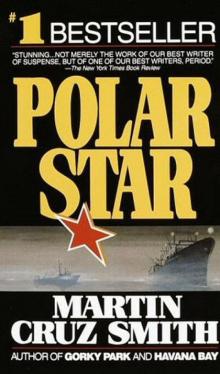 Polar Star
Polar Star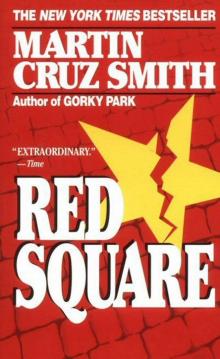 Red Square
Red Square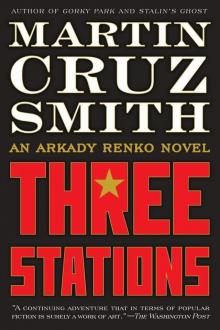 Three Stations
Three Stations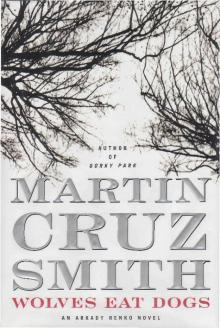 Wolves Eat Dogs
Wolves Eat Dogs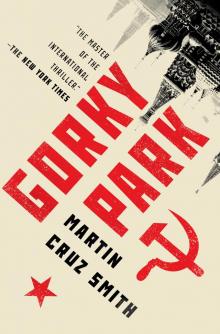 Gorky Park
Gorky Park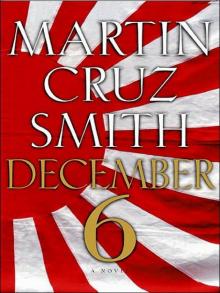 December 6
December 6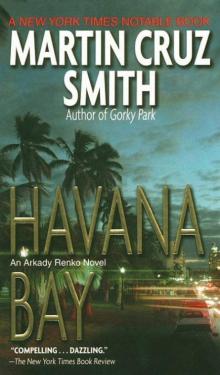 Havana Bay
Havana Bay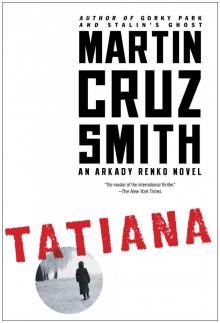 Tatiana
Tatiana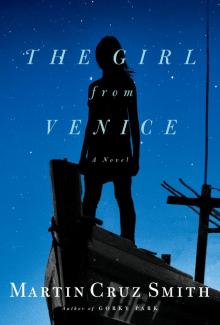 The Girl From Venice
The Girl From Venice Stalin's Ghost
Stalin's Ghost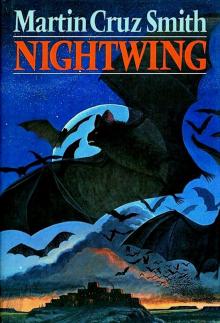 Nightwing
Nightwing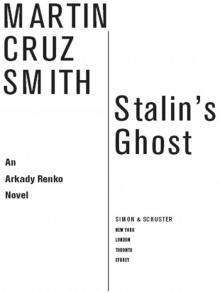 Stalin s Ghost
Stalin s Ghost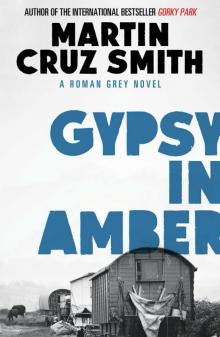 Gypsy in Amber
Gypsy in Amber Rose
Rose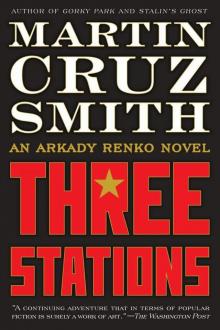 Three Stations: An Arkady Renko Novel
Three Stations: An Arkady Renko Novel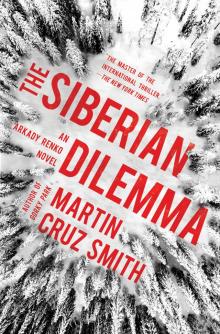 The Siberian Dilemma
The Siberian Dilemma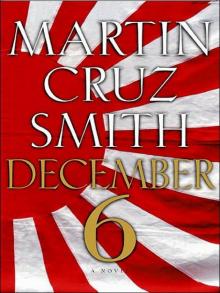 December 6 (V5.0)
December 6 (V5.0)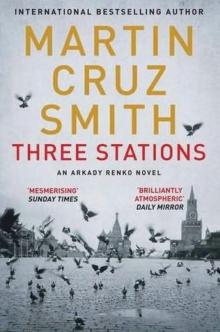 Three Stations ar-7
Three Stations ar-7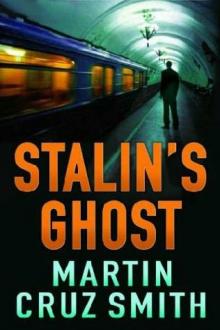 Stalin’s Ghost ar-6
Stalin’s Ghost ar-6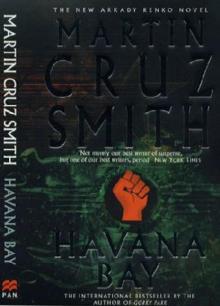 Havana Bay ar-4
Havana Bay ar-4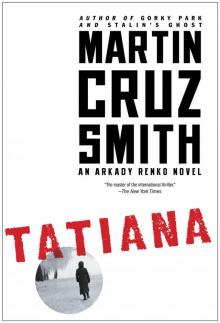 Tatiana ar-8
Tatiana ar-8